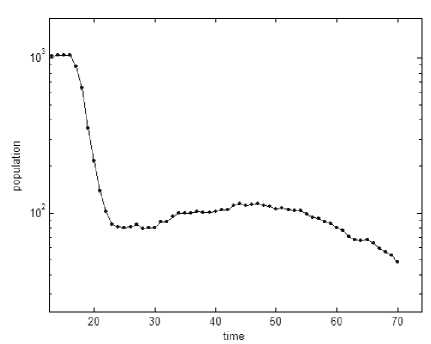wealth distribution. Furthermore, we also should note that the way an agent chooses other
agents via the economic situation of individuals is not directly at all. In return, the wealthier
an agent the higher his/her possibilities to become smarter ( qm(int elligence) (t) >> ) as well as to
be better in physical outlook, qm(p)(t)>> (the opportunity to have better complexions, body
building or skin treatment, etc.). Nonetheless, this scaling feature is still interesting for none
economic motives and expectation directly included in an agent’s decision making.
Learning from the properties of the power law as discussed in detail by Newman
(2005), we can see that the expected maximum value in our samples would fulfill,
1
< Xmax >~ n (α-1) (1)
and as 2<α<1, we could see that < xmax > would diverge and by regarding to the mean of
the power law characteristic as n →∞, the mean is finite but dominated by the largest
value in the sample. Here, we can realize that as the sample data grows larger, the
wealthiest agents in our Ribbon of Love rule relatively almost all of the economic system. A
widely-accepted understanding on romance and love story brought to us the dominance of
the richer among other population.
4. Love, Infidelity, Marriage Liberalism
In our previous computational experiments we assume that agents would always be
faithful with their spouses: there is no way there would be any possibilities an agent flirt
with other agent as they are in the state of marriage couples. However, what happens in the
real world is never like that, especially when the self-centered society and marriage or
sexual-related relations is relatively not really a sacred things. This distinction can be
observed in the more religious society which the traditional understanding about marriage
and sex as a kind of taboo like Indonesia.

Figure 5. The negative population growth (left) and higher average economic growth (right) when the short-
term and choosier agents dominate.

Page | 7
More intriguing information
1. An Attempt to 22. Gender and aquaculture: sharing the benefits equitably
3. Do Decision Makers' Debt-risk Attitudes Affect the Agency Costs of Debt?
4. Kharaj and land proprietary right in the sixteenth century: An example of law and economics
5. Equity Markets and Economic Development: What Do We Know
6. The name is absent
7. Improvements in medical care and technology and reductions in traffic-related fatalities in Great Britain
8. DURABLE CONSUMPTION AS A STATUS GOOD: A STUDY OF NEOCLASSICAL CASES
9. The name is absent
10. The name is absent